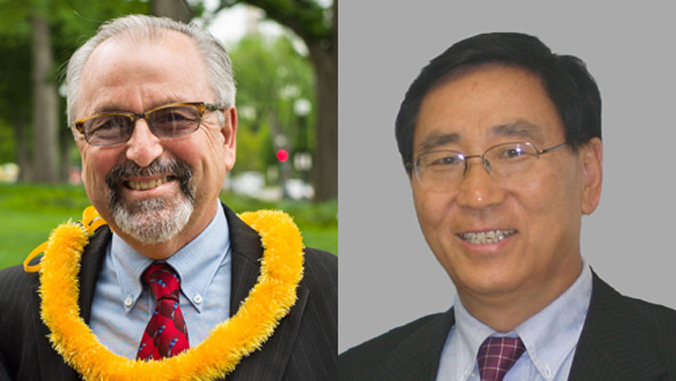
Two University of Hawaiʻi at Mānoa faculty members, atmospheric scientist Bin Wang and oceanographer David Karl, were named in the top 25 researchers internationally according to the Research.com ranking. Based on a meticulous examination of 166,880 scientists on Google Scholar and Microsoft Academic Graph, the rankings report on the impact of research published by scientists in 21 disciplines.
Wang and Karl were ranked among more than 9,198 profiles in the environmental sciences discipline—placing them in the top 0.2% of researchers worldwide.
“These two world class scientists exemplify not only excellence in research and the search for truth, but also a thoughtful, caring, and nurturing attitude toward their students and colleagues,” said Chip Fletcher, interim dean of the UH Mānoa School of Ocean and Earth Science and Technology (SOEST). “Bin and Dave are known far and wide as outstanding teachers and mentors who express a genuine kindness, a holistic love for our Earthly home, and a deep concern for the future of humanity. We are indeed blessed to know them as friends and collaborators.”
Bin Wang
Wang, ranked No. 13 internationally and No. 7 in the nation, is an emeritus professor who has been with the Department of Atmospheric Sciences (formerly Department of Meteorology) at UH Mānoa since 1987. He is a leading meteorologist specializing in climate and atmospheric dynamics. Among his research interests are variability and predictability of Asian-Australian monsoons, climate predictions, tropical cyclones and El Niño – Southern Oscillation dynamics.
The ranking reported that Wang’s publications have more than 63,000 citations. Active in the science community, he has organized numerous international workshops and conferences and has been serving on scientific advisory committees in his field. Wang is among the most influential scientists in monsoon research worldwide and in development of meteorological sciences and climate predictions in the Asia-Pacific region.
David Karl
Karl, ranked No. 25 in the world and No. 13 nationally, is the Victor and Peggy Brandstrom Pavel Professor of Microbial Oceanography and director of the Daniel K. Inouye Center for Microbial Oceanography: Research and Education. As a microbial oceanographer, he has studied the distribution and metabolic activities of microorganisms at various sites in the global ocean from the equator to both poles and from the surface to the greatest ocean depths.
In 1988, he co-founded the Hawaii Ocean Time-series program as a sentinel for observing the effects of climate on the structure and function of microbial communities. He has spent more than 1,000 days conducting research at sea including 23 expeditions to Antarctica. Karl’s research has centered around the ocean’s carbon cycle from photosynthetic production of organic matter to carbon sequestration in the deep sea. A member of the National Academy of Sciences, Karl’s publications continue to advance the field of microbial ecology and collectively have more than 53,000 citations, according to the new ranking report.
This recognition is an example of UH Mānoa’s goal of Excellence in Research: Advancing the Research and Creative Work Enterprise (PDF) and Building a Sustainable and Resilient Campus Environment: Within the Global Sustainability and Climate Resilience Movement (PDF), two of four goals identified in the 2015–25 Strategic Plan (PDF), updated in December 2020.
–By Marcie Grabowski

